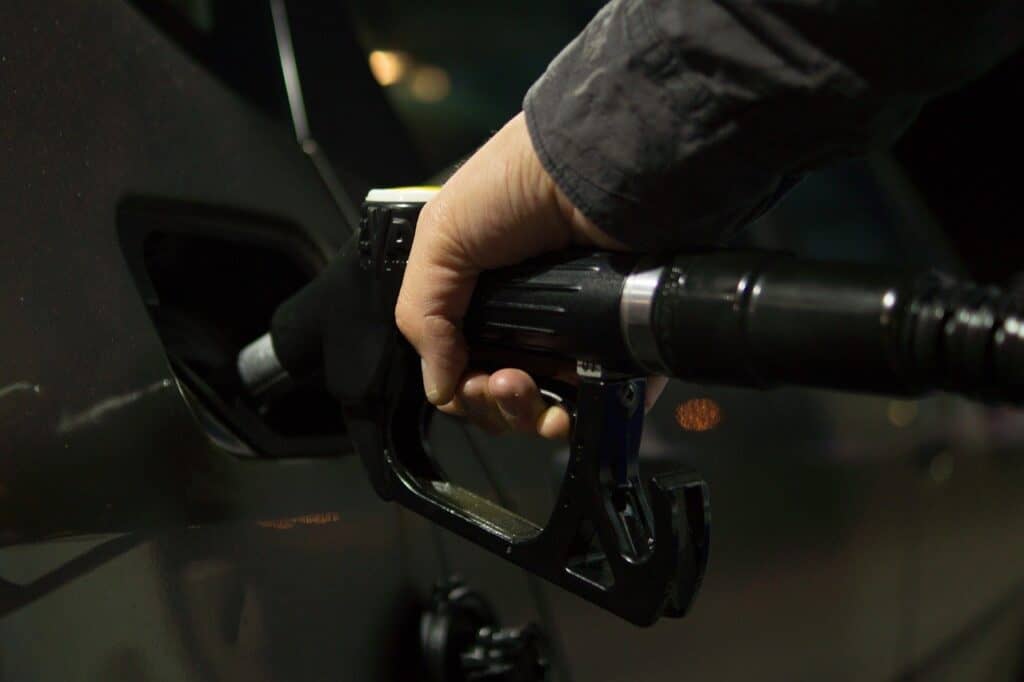If you have a vehicle of some sort, then the odds are pretty good that you’re going to put gasoline in it and that at some point or another, you might spill some of that gasoline. The bad news is that gasoline is flammable and if you spill it, it becomes a fire risk. But how long is spilled gasoline flammable?
A gasoline spill will remain flammable as long as it continues to produce flammable vapors. This time can vary from a few minutes to a day, depending on the size of the spill and ambient temperature.
Let’s take a closer look at this, so you are well informed about a gasoline spill and what you should do.
Your # 1 priority is keeping your family safe. As a firefighter, I recommend everyone has updated smoke detectors that don’t require battery changes, like these ones from Kidde, a fire extinguisher, like this one from Amerex, and a fire escape ladder if you have bedrooms above the first floor, I recommend this one from Hausse.
Also read: Is Diesel Fuel Flammable?
How Long Is Gasoline Flammable When Spilled?

It really depends on the volume of spillage. In order for gasoline to be flammable, the wet liquid needs to be able to boil and become vapor.
Unfortunately, the boiling point of gasoline is fairly low and that means it’s easy for it to boil and become flammable.
However, this is also good news, because it means that the gasoline should dry reasonably quickly. Once the gasoline has dried up, it’s been consumed, and assuming the area is well-ventilated, the risk of a vapor ignition is low.
That doesn’t mean that the risk of a fire is reduced to zero, though, because while dry gasoline isn’t flammable, it can still burn.
So, as a semi-useful rule of thumb, for a small gasoline spill, assuming that you’ve mopped up most of the liquid, you can probably consider the gasoline to be flammable for about 15 minutes or so.
For a bigger spill though, it may take longer to clear.
Also read: Is Kerosene Flammable?
How Long For Gasoline To Evaporate?
Gasoline takes almost no time to evaporate under ideal circumstances. Unfortunately, most of the time, circumstances are not ideal.
You need an impermeable surface to spill your gasoline onto for “ideal circumstances”, that is a surface that won’t absorb the gasoline.
Most of the time gasoline spills tend to be onto concrete or tarmac and thus, the gasoline can soak into the surface or even deep down into the area it was spilled on.
Woods and fabrics are even more likely to become soaked through with gasoline and thus, even more, likely to retain that gasoline for longer.
All this means in real terms is that while gasoline could evaporate quickly, it probably won’t and it may take from 90 minutes to a whole day to do so.
Also read: Is Brake Fluid Flammable?
Is Spilled Gasoline Actually Flammable?
Yes, while it’s the vapor that ignites rather than the fluid, gasoline has a very low flashpoint, and thus, whenever the fluid is present, so is the vapor.
The flashpoint of the vapor is around -46 degrees Fahrenheit! That means it takes almost no effort to burn gasoline.
Can Gasoline Ignite?
Yes.
In fact, almost everything can ignite under the right circumstances.
The ignition point of gasoline is low in the presence of a spark or fire, but it won’t auto-ignite (that is spontaneously combust) until you reach about 500-800 degrees Fahrenheit.
Also read: Can Static Electricity Start A Fire?
Can Dried Gasoline Catch Fire?
Everything can burn if put under the right circumstances. However, assuming that the area is thoroughly dried then it should be no more combustible than it was before the gasoline was applied to it.
Be careful with fabrics and wood though, it is possible for the gasoline to sink into the material to a depth where you are unaware that it is still “wet”.
If you can smell gasoline on something, proceed with caution.
Also read: Is Transmission Fluid Flammable? Yes and No…
Does The Quality Of The Gasoline Matter To Its Flammability?
Yes, the quality of gasoline does affect the flammability, but not as much as some people online claim.
Nobody uses pure gasoline except in laboratory conditions, almost all other forms of gasoline are mixed with other chemicals to change the burning properties of the gasoline.
This is done for use in different vehicles depending on the needs of the engine. However, if we take unleaded gasoline, it has a flashpoint of -45 and an autoignition range of 459-853 and we compare it with 50-100 octane fuel then that has a flashpoint of -36 to -45 and an autoignition range of 536 – 853.
Also read: Is Hydraulic Fluid Flammable? Yes and No…
Does Where The Gasoline Is Spilled Affect Flammability?
Yes, to some extent. There are two types of surface to consider permeable and impermeable.
An impermeable surface (say glass or steel) won’t soak up any of the gasoline that has been spilled. This allows all the gasoline to easily evaporate.
This, in turn, means that in the early moments of a gasoline spillage, the gas is going to become vapor more easily on an impermeable surface and thus, be more flammable.
However, assuming the area is well-ventilated, the vapor will swiftly clear and the chances of fire will quickly drop once the gasoline has all evaporated.
With a permeable surface, the risks are different. It takes longer to evaporate in the first instance, which means the surface may hold gasoline for much longer, and thus, there’s a risk of fire for a longer period of time.
Also read: Is Power Steering Fluid Flammable?
How Long Will The Smell Of Gasoline Last?
Gasoline has a harsh odor and this might be considered a “good thing” because as long as you can smell the gasoline that was spilled, you know that there’s a risk of fire due to its flammability.
After all, what you smell is the vapor given off as the gasoline evaporates.
However, when gasoline is spilled into heavily porous surfaces the smell can last even when the vapors are all gone because there’s some gasoline trapped in the material. It may last until it has been properly cleaned.
This can be a problem for your clothes and for your vehicle.
Also read: Is Diesel Exhaust Fluid (DEF) Flammable?
Can You Remove The Smell Of Gasoline From Your Clothing?
It depends on how much gasoline has soaked into the clothing. If you basically dipped your t-shirt in gasoline, you’re going to need to throw it out.
If you have to throw it out, then make sure that you allow them to dry completely before putting them in the garbage (flatten the clothes out don’t ball them up for this).
If that’s not an option, then take them to a local waste management facility and drop them into a designated container for disposing of gasoline-soaked items.
Assuming that your clothes are salvageable:
- Blot off the excess gasoline using a paper towel or rag
- Then cover the stain in baking soda and let it sit for around 5 minutes
- Then pop the baking soda in a plastic bag and dispose of it
- Next soak the clothing in a bowl of 1:1 vinegar and hot water. Leave it for an hour.
- Then ensure that there’s not even a hint of gas smell on the clothing, if there is, soak it some more.
- Take only the clothing you have soaked (do not wash it with other items) and place it in the washing machine.
- Run the machine at the hottest possible cycle for the clothing and use a no-fragrance detergent.
- Then air-dry the clothing outside.
It should now be safe to wear again.
Also read: How to Put Out a Fire on Someone’s Clothes: A Guide
How Do You Remove The Smell Of Gasoline From A Vehicle?
Baking soda, vinegar, and water, then soap and water and a lot of air drying and open windows.
Unfortunately, it’s harder to clean a car from a gasoline spill than a t-shirt because you can’t easily soak the interior of a car.
If you’re at all nervous about the job you’ve done, it might be a good idea to call in a professional to clean it for you.
This video gives some more specific tips for gasoline spilled in a car:
Also read: Is Vinegar Flammable? Can it Catch Fire?
What Should You Do If You Spill Gasoline?
If you want to avoid a gasoline fire, the best thing to do is not spill it in the first place, but if you do spill gasoline, you can certainly make things less dangerous.
Firstly, ensure you do not turn on any electrical equipment or other possible sources of ignition (sparks) and don’t start any fire (such as for lighting a cigarette). That could lead to an immediate ignition of the gasoline.
1. Stop The Spillage Of Gasoline
The first thing to do is to stop the spill. That is close up any taps or open lids, stand up the fallen canister, that sort of thing.
2. Catch Any Spilling Gasoline
Then if there’s still gasoline pouring out of the container, catch it in something. Ideally, a metal tin or bucket but anything that stops it from continuing to run all over the place is a good idea.
3. Place Physical Barriers To Prevent Gasoline Leakage
Then it’s time to ensure that gas that has already spilled doesn’t go anywhere else, put up some temporary barriers of cloth to prevent it from rolling away, douse the fluid in baking soda or flour to help soak it up, and leave it for 2 hours.
Sweep up the material as needed after 2 hours and if it’s still wet, re-apply the baking soda/flour.
Then take the material outside in an open container and leave it to dry thoroughly.
Then wash the space with soapy water.
4. Ventilate The Space That You Spilled The Gasoline In
Once you’ve got things as dry as you can. Remove the cloths you caught the spill with and leave them to air somewhere safe until they are dry.
Open the windows and doors in the space that the spill took place in to allow the vapors to mix with the outside air.
Wait for the space to dry fully and keep others away from it until then.
Finally, contact a local hazardous material management center and ask for their help in disposing of the waste products.
Here is a video showing another cleanup method using kitty litter:
Related Articles
What Makes Something Flammable?

